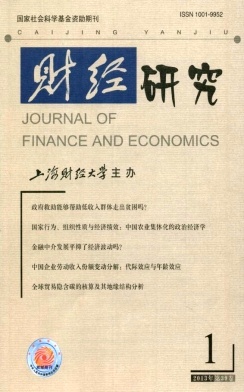人文差异与外商直接投资的区位选择偏好
财经研究 2013 年 第 39 卷第 01 期, 页码:124 - 135
摘要
参考文献
摘要
文章通过建立多国竞争博弈模型分析了人文差异对FDI区位选择偏好的影响机制,构建了基于面板数据的FDI区位选择偏好两步估计计量模型,在此基础上,利用118个国家(地区)1992-2010年的中国FDI和人文地理数据估算了各国及地区对中国FDI的偏好程度,检验了人文及地理差距对FDI区位选择偏好的影响。研究结果表明,投资国与中国的人文及地理差距对投资国的FDI选择偏好具有较强的负面影响,并且人文差异的作用要远大于地理距离。拥有共同语言是提高各国对中国FDI偏好的基础,而增强价值观认同则是提高各国对中国FDI选择偏好的重要推动力。
[1]黄肖琦,柴敏.新经济地理学视角下的FDI区位选择——基于中国省际面板数据的实证分析[J].管理世界,2006,(10):7-13.
[2]刘兴亚,李湘宁,缪仕国,姜子叶.资产专用性、文化差异与外资进入模式选择——基于交易成本框架的分析[J].金融研究,2009,(3):72-84.
[3]潘镇,鲁明泓.在华外商直接投资进入模式选择的文化解释[J].世界经济,2006,(2):51-61.
[4]孙焱林,胡松.文化和地理因素对中国外商直接投资的影响[J].国际贸易问题,2004,(10):60-64.
[5]王俊.文化差异与跨国公司在华投资的独资化倾向[J].国际贸易问题,2007,(12):99-105.
[6]殷华方,鲁明泓.文化距离和国际直接投资流向:S型曲线假说[J].南方经济,2011,(1):26-38.
[7]张建红.投资国特征及其对华投资强度的研究[J].世界经济,2004,(1):16-22.
[8]Bhattacharya U,Grozhi k P.Melting pot or salad bowl:Some evidence from U.S.invest-ments abroad[J].Journal of Financial Markets,2008,11(3):228-258.
[9]Dunning J H.International production and multinational enterprises[M].London:Allen and Unwin,1981.
[10]Franke G R,Nadler S S.Culture,economic development,and national ethical attitudes[J].Journal of Business Research,2008,61(3):254-264.
[11]Gao T.Ethnic Chinese networks and international investment:Evidence from inward FDI in China[J].Journal of Asian Economics,2003,14(4):611-629.
[12]Goldberg M A,Heinkel R L,Levi M.D.Foreign direct investment:The human dimen-sion[J].Journal of International Money and Finance,2005,24(6):913-934.
[13]Hofstede G.Culture’s consequences:Comparing values,behaviors,institutions,and or-ganizations across nations[M].CA:Sage Publications,2001.
[14]Inglehart R,Welzel C.Modernization,cultural change and democracy[M].New York:Cambridge University Press,2005.
[15]Lin A Y.Law,culture and investment performance:A cross-country analysis[J].Glob-al Finance Journal,2008,19(3):323-341.
[16]Lu J W,Beamish P W.International diversification and firm performance:The S-Curve hypothesis[J].Academy of Management Journal,2004,47(4):598-609.
[2]刘兴亚,李湘宁,缪仕国,姜子叶.资产专用性、文化差异与外资进入模式选择——基于交易成本框架的分析[J].金融研究,2009,(3):72-84.
[3]潘镇,鲁明泓.在华外商直接投资进入模式选择的文化解释[J].世界经济,2006,(2):51-61.
[4]孙焱林,胡松.文化和地理因素对中国外商直接投资的影响[J].国际贸易问题,2004,(10):60-64.
[5]王俊.文化差异与跨国公司在华投资的独资化倾向[J].国际贸易问题,2007,(12):99-105.
[6]殷华方,鲁明泓.文化距离和国际直接投资流向:S型曲线假说[J].南方经济,2011,(1):26-38.
[7]张建红.投资国特征及其对华投资强度的研究[J].世界经济,2004,(1):16-22.
[8]Bhattacharya U,Grozhi k P.Melting pot or salad bowl:Some evidence from U.S.invest-ments abroad[J].Journal of Financial Markets,2008,11(3):228-258.
[9]Dunning J H.International production and multinational enterprises[M].London:Allen and Unwin,1981.
[10]Franke G R,Nadler S S.Culture,economic development,and national ethical attitudes[J].Journal of Business Research,2008,61(3):254-264.
[11]Gao T.Ethnic Chinese networks and international investment:Evidence from inward FDI in China[J].Journal of Asian Economics,2003,14(4):611-629.
[12]Goldberg M A,Heinkel R L,Levi M.D.Foreign direct investment:The human dimen-sion[J].Journal of International Money and Finance,2005,24(6):913-934.
[13]Hofstede G.Culture’s consequences:Comparing values,behaviors,institutions,and or-ganizations across nations[M].CA:Sage Publications,2001.
[14]Inglehart R,Welzel C.Modernization,cultural change and democracy[M].New York:Cambridge University Press,2005.
[15]Lin A Y.Law,culture and investment performance:A cross-country analysis[J].Glob-al Finance Journal,2008,19(3):323-341.
[16]Lu J W,Beamish P W.International diversification and firm performance:The S-Curve hypothesis[J].Academy of Management Journal,2004,47(4):598-609.
引用本文
许和连, 吴钢. 人文差异与外商直接投资的区位选择偏好[J]. 财经研究, 2013, 39(1): 124–135.
导出参考文献,格式为:
本期封面
相关论文





 7369
7369  4216
4216

